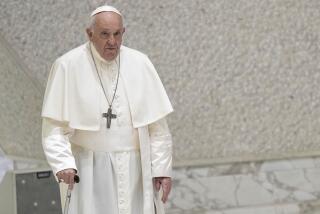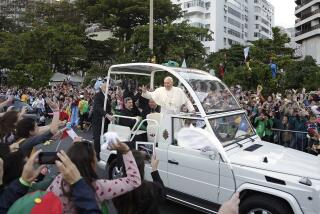Pope Cautions Independent-Minded Jesuits : Religion: He lauds their contribution to learning, urges them not to stray from Catholic mainstream.
VATICAN CITY — The independent-minded Jesuits, the largest and most influential order of Roman Catholic priests, opened a worldwide congress here Thursday under papal injunction to be “totally and without reservation of the church, in the church and for the church.”
Addressing 223 delegates to the 34th congregation of the activist Society of Jesus, Pope John Paul II lauded the Jesuits for their global contribution to learning and education. But, ever stern in defense of church dogma, the Pope cautioned against straying from the Catholic mainstream.
“We must be very attentive lest the faithful be confused by questionable teachings, by publications or speeches clearly at variance with the church’s teachings on faith and morals,” the doctrinally conservative Pope told leaders of an order with whom he has crossed swords in the past.
Founded by the Spaniard St. Ignatius of Loyola in 1540, the Jesuits are the church’s most rigorously educated priests and are noted for their scholarship. There are 185 Jesuit colleges and universities around the world, 28 of them in the United States. In Rome, the Jesuits run Vatican Radio and provide the multinational faculty for three blue-ribbon pontifical universities.
Praising the Jesuits for “collaborating in every part of the church’s life,” John Paul admonished the 23,179-member order to overcome “every temptation of provincialism, regionalism or isolationism.”
Disturbed by what he considered too much independence in Jesuit theological and social thinking, John Paul curbed the Jesuits in 1981, at a time when the order was pressing for a stronger church voice in defense of human rights and the poor in the Third World.
Jesuits elect their own superior, but the Pope named a caretaker to succeed the ailing Rev. Pedro Arrupe until the 1983 election of the Rev. Peter-Hans Kolvenbach as the order’s new Father General.
Historically, the Jesuits’ chief has been so influential that he is nicknamed “the black pope,” but under the conciliatory Kolvenbach, a peacemaking moderate, the order has steadily improved relations with the Pope, to whom Jesuits swear a special vow of loyalty.
“The tone of the speech was positive; it marked a definite warming. Many delegates saw it as a sign we are back on good terms with the Holy See,” said the Rev. Thomas Lucas, a congregation spokesman.
Kolvenbach called the congregation, the first since 1983, to update the order’s legal structure and to consider the Jesuit response to papal calls for new evangelization on the eve of Christianity’s third millennium.
*
At the three-month congress, delegates chosen from aging Jesuit communities around the world will also weigh the cloudy future of a thinly spread order whose membership is declining at about 1% a year. In their deliberations, delegates will also mull a still-unfocused proposal that would encourage the formal connection of lay Catholics to the society to help avoid curtailment of its activities.
The United States still has the largest number of Jesuits, 4,261 of them, but vocations are declining amid the need to staff and direct schools like Georgetown University, Boston College, Santa Clara University and the University of San Francisco.
More to Read
Sign up for Essential California
The most important California stories and recommendations in your inbox every morning.
You may occasionally receive promotional content from the Los Angeles Times.










